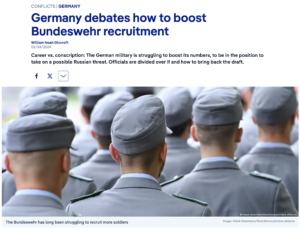In a detailed and nuanced analysis we explore the complex and pressing issue of Germany’s Bundeswehr recruitment and the broader context of European defence readiness against a potential Russian threat. This exploration, drawing from an article by William Noah Glucroft for Deutsche Welle of Germany, delves into the intricacies of military conscription, recruitment challenges, and the geopolitical landscape that Europe faces today.

Germany’s Bundeswehr finds itself at a critical juncture. After years of neglect, there’s a concerted effort to rejuvenate the military with substantial investments in planes, tanks, and ammunition. However, the challenge extends beyond financial resources; it’s about manpower. The Bundeswehr needs people to operate and maintain this sophisticated machinery, leading to revived discussions about the reintroduction of conscription, a debate that resonates across much of Europe. The German Defense Ministry, facing the daunting task of expanding the Bundeswehr to 203,000 personnel by 2031, is considering various models of conscription to meet this goal.
The concept of conscription is not new to Germany. Both former East and West Germany mandated military service for men post-World War II. This practice continued after reunification until its suspension in 2011. However, the legal framework for conscription remains in the Basic Law, Germany’s constitution, allowing for its possible reinstatement. Defence Minister Boris Pistorius has labeled the suspension a “mistake,” advocating for a public discussion on reinstating conscription, considering it essential for ensuring a well-rounded and democratic military force, and potentially addressing the issue of far-right sympathisers within the ranks.
The German debate is set against the backdrop of a broader European security concern. Stark warnings from Polish officials and German think tanks indicate that Europe has a limited window, possibly as short as three years, to bolster its defences against a potential Russian assault on NATO. This urgency is driven by the recent military engagements of Russia in Ukraine, revealing limitations in Western military aid and challenging Europe’s readiness to counter Russian aggression.
Russia’s increasing defence spending, coupled with President Vladimir Putin’s ambitions to restore its imperial grandeur, adds to the urgency. This situation is further complicated by uncertainties in the United States’ commitment to NATO, particularly under a potential future presidency of Donald Trump, who has previously expressed ambivalence towards the Alliance. The prospect of a Europe, possibly without its strongest ally, standing against an emboldened Russia, heightens concerns for the continent’s security and geopolitical stability.
The predicament of Europe, especially the NATO member states that were once part of the Soviet sphere, such as Estonia, Latvia, Lithuania, Romania, and Poland, is particularly acute. These countries serve as strategic buffers between Western Europe and Russia and are crucial to the stability and security architecture of Europe. Their vulnerability is a significant factor in Europe’s defence calculations, making the prospect of their targeting in a Russian expansionist strategy a matter of grave concern.
The debate over conscription in Germany and the larger question of European defence readiness are part of a complex tapestry of geopolitical challenges. As Europe grapples with these issues, the German model of conscription, whether it mirrors Sweden’s Total Defence Service or takes another form, could have significant implications. Sweden’s model, which involves sorting citizens into various civilian and military roles based on need and ability, is being closely examined as a potential blueprint.
In contrast, the United States maintains a more passive Selective Service System, requiring registration but not active service. The effectiveness of such models in today’s geopolitical climate is a matter of debate, particularly in light of the recent performance of NATO weaponry in Ukraine and the growing Russian military might.
As Germany and Europe wrestle with these decisions, the clock is ticking. The need for a rapid and decisive response to the evolving Russian threat is imperative. Europe’s larger economy, resources, industry, and population provide it with certain advantages in a potential conflict with Russia. However, the real challenge lies in whether European nations will be prepared to confront this threat, both in supporting Ukraine and in bolstering their own defences.
The issue of Bundeswehr recruitment in Germany is not just a national concern but a focal point in the larger narrative of European security. It reflects the continent’s struggle to balance military readiness with democratic values, the complexities of international alliances, and the ever-present shadow of Russian ambition. As Europe navigates these turbulent waters, the decisions made in the coming years will be pivotal in shaping the future geopolitical landscape.
Stay informed on European political tensions and armed conflicts with our unique magazine. Subscribe for exclusive insights into current affairs and ongoing global issues.

